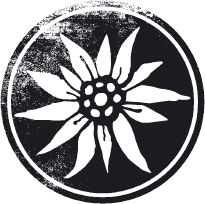
PAPA
It was deathly quiet in the house. Or quiet and noisy at the same time, which was strange. I could hear the air in the room; hear it moving in and out of my ears and circling my head. The thump, thump, thump of my heart was like the drums when we marched. The kitchen clock was like a ticking bomb, each click of the hidden cogs echoing in my head.
Waiting at the window, I watched the cars and people. A horse and cart went past, loaded with barrels and crates. I felt more alone than ever before. Out there, everyone was carrying on as usual. Ralf and Martin would be doing what they always did; they wouldn’t know anything about what had happened to Papa. Then I remembered there was a photograph of Papa in the drawing room, so I went to look at it.
We didn’t use that room much; mostly it was for if we had guests, and it smelled musty inside. Mama always kept it clean, but the furniture was old and the soft cushions soaked up the dust. If you banged them out on a bright day, when the sun was streaming through the windows, you could see the dust floating in the air.
It wasn’t bright in there that morning, though. The heavy red blackout curtains were still pulled shut, and the only light that came in was from the open door.
My feet were quiet on the worn carpet as I crossed the room. Reaching the sideboard at the far end, I stopped and stared at the unframed photograph propped against an empty vase.
Not much bigger than a playing card, it was a close up of Papa in his uniform tunic. He was looking just to his left and there was the slightest suggestion of a smile on his lips, as if he’d seen something funny and was trying not to laugh.
A hint of his close-cut hair was visible beneath the cap set at an angle on his head. On the front of the cap was the badge of the German Army; a bold and angular eagle clutching a wreath that circled the swastika.
I often used to sneak in to look at that photograph. Especially after the talks at the clubhouse. Sometimes someone would come from the army or the Nazi party to talk to us about racial theory or tactics or Nazism or just about how special we were. We were the youth, they told us; the future of our country. We were important. That always made me feel proud, and afterwards, I would come home and creep into the drawing room to look at the photo of Papa, who was out there making the world a better and stronger place.
I wiped a tear from my eye. ‘I wish you were here,’ I said to the photograph.
When my grandparents arrived, they came in like a whirlwind. Well, Oma did, anyway.
I heard her before I saw her. The old car pulled up with a splutter and a squeak, and then her voice was there, filling the street, getting louder as she came to the door. If the other people in the building weren’t already awake, they would be now.
‘… to be looked after. I won’t take no for an answer,’ she was saying, and then there was a quick hard knocking at the door, just as I reached it and pulled it open.
Oma wasn’t big – in fact, she was quite skinny – and if you saw her from a distance, you wouldn’t think she was much of anything. She was neither tall nor short, but had settled somewhere in between. She didn’t dress for attention and her face was creased with the same lines that anyone her age would have. But, close up, you could see the fire in her eyes. And when she opened her mouth to speak, you could tell, right away, that she was not a woman to be trifled with.
‘Karl,’ she said, pulling me into her and pressing me against her chest. ‘You poor, poor boy. Now, where’s your mama?’ She released me and marched upstairs calling, ‘Hannah! Hannah! Where are you? Ah, there you are, my darling daughter. I’m so sorry. So sorry about Oskar. He was a good man.’
Opa came in a few seconds later. A tall, thickset man who would always stand out in a crowd. He had been a boxer in the army when he was young and he still had something of his athletic build. He did fifty press-ups and fifty sit-ups every morning when he woke and another fifty of each every night before he went to bed. He didn’t talk a lot – he always said Oma did enough talking for the both of them – and he had friendly creases around his eyes that stretched right back to his ears when he smiled.
He wasn’t smiling now, though.
He closed the door behind him and put a hand on my shoulder and nodded. ‘Be brave,’ he said.
‘Where’s Stefan?’ I asked.
‘Waiting at home. Now go and collect your things, you’re coming with us.’